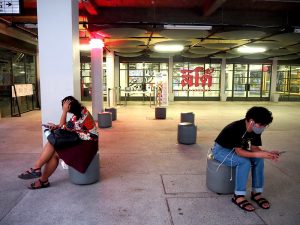Thailand is planning to order a large shipment of the Pfizer-BioNTech coronavirus vaccine, Prime Minister Prayut Chan-o-cha said yesterday, as his government attempts to fight off accusations that it has sleepwalked through into the midst of a potentially devastating third wave.
Prayuth told reporters that the National Vaccine Institute is negotiating with Pfizer over the price and other conditions for the supply of 5 million to 10 million doses.
“We’re still waiting for quotations and terms and conditions,” the former general told reporters, adding that he hoped delivery to start in July and be completed by December.
Thailand is currently in the grip of its third and most serious wave of COVID-19, with the number of daily new cases exceeding 1,000 for the first time in recent days. On Tuesday, the Ministry of Health announced 1,443 new cases and four deaths, bring the totals to 45,185 cases and 108 fatalities since the beginning of the pandemic.
The outbreak, linked to nightspots in and around Bangkok, has also seen the more contagious B.1.1.7 variant first identified in the United Kingdom.
Thailand seems to perpetuate the curious inverse relationship seen in many countries between the success of COVID-19 containment efforts and the speed and efficacy of vaccine rollouts.
Despite recording just 7,000 cases and 63 deaths during the pandemic year of 2020, Prayut’s government has been widely criticized for making late and inadequate efforts to secure vaccine supplies. So far, these include delivery of about 2 million doses of AstraZeneca and Chinese Sinovac vaccines.
The Thai government had initially hoped to administer 61 million jabs over the course of 2021 – and almost 30 million doses by August – but as of April 19, just 0.82 percent of the country’s 69 million people had received at least one vaccine dose, according to the Our World in Data website run by Oxford University.
In December, the local firm Siam Bioscience struck a technology sharing deal with AstraZeneca to produce its coronavirus vaccines in Thailand, but the arrangement was criticized for its lack of transparency, and the company’s reluctance to communicate with the media.
In February, popular opposition politician Thanathorn Juangroongruangkit was charged with royal defamation for questioning the arrangement, given that Siam Bioscience is owned by Thailand’s King Vajiralongkorn, whose wealth and power has been the target of a simmering protest movement.
On April 16, Siam Bioscience issued a statement claiming that its production was on schedule, and that after the vaccines are delivered to AstraZeneca for testing, “AstraZeneca will deliver the vaccines to the Thai government as scheduled in June.” The firm previous stated that it had the capacity to make up to 18 million doses per month.
Until then, the surge of COVID-19 cases is on the cusp of overwhelming the number of available hospital beds, given Thailand’s policy of hospitalizing all who test positive for COVID-19, even those without symptoms. For this reason, too, some hospitals are growing reluctant to offer tests for COVID-19, while the authorities have set up new field hospitals in anticipations of further infections.
On the weekend, Prayut announced a new suite of restrictions designed to contain the third wave, ordering the closure of schools, pubs, clubs, karaoke bars, and massage parlors, and capping events at 50 people. However, it stopped short of imposing a strict lockdown or curfew, concerned at the potential economic impacts.
Yet some degree of economic pain now seems unavoidable. As I noted last week, a protracted vaccine rollout threatens to set back the government’s economic recovery plans by months, if not years. As it stands, the new order of Pfizer-BioNTech vaccines is an admission by Prayut’s government that its glacial vaccine procurement program not only threatens to hold back Thailand’s recovery, but also to undermine further its own popularity.

































